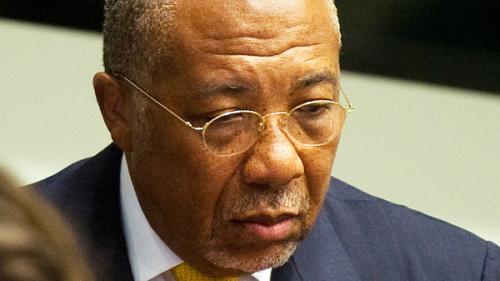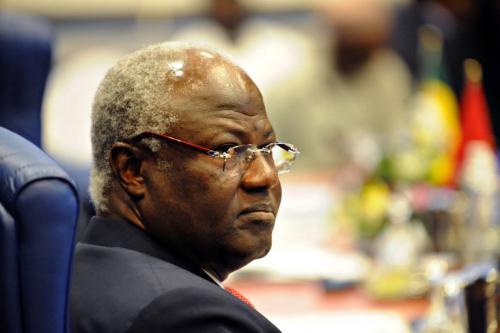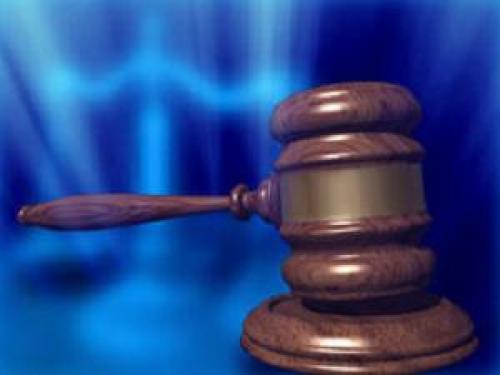13 June 2012 :
Former Liberian President Charles Taylor was sentenced to 50 years imprisonment for arming and supporting murderous rebels in Sierra Leone in return for "blood diamonds," a landmark sentence activists hope will send a clear message to despots around the world that they will be held to account for sponsoring atrocities.Taylor, wearing a blue suit and gold tie, stood grim-faced and silent as Presiding Judge Richard Lussick of Samoa imposed what will likely amount to a life sentence for the 64 year old.
Lussick said Taylor's position as head of state at the time of his crimes put him in a "class of his own" when judges came to setting the sentence — one of the longest ever handed down by the Special Court for Sierra Leone or any other international tribunal.
Taylor shipped arms, ammunition and other supplies to rebels in Sierra Leone in return for personal wealth in the form of diamonds mined by slave labor and to gain increasing political clout in the volatile West Africa region.
Taylor's reaction in court Wednesday was in stark contrast to the delight of survivors who gathered in the Sierra Leone capital, Freetown, to watch a live feed of the sentencing .
"That makes me the happiest person on earth," said Alimami Kanu, who was 11 when rebels backed by Taylor hacked off his right hand. He was one of thousands of civilians mutilated during Sierra Leone's decade-long civil war that ended in 2002 with some 50,000 dead.
Human rights activists and international law experts also hailed the tough sentence as a warning shot for war criminals.
"Today's sentence not only reflects the severity of Taylor's crimes but sends a clear message that individuals who aid and abet war crimes can no longer act with impunity," said Patrick Alley, director of Global Witness, a nongovernment group that campaigns to prevent conflicts erupting around exploitation of natural resources such as diamonds and timber.
The sentence came a month after Taylor became the first former head of state since World War II to be convicted by an international court. Judges found him guilty of 11 counts of war crimes and crimes against humanity, including murder, rape, torture and the use of child soldiers.
"The lives of many more innocent civilians in Sierra Leone were lost or destroyed as a direct result of his actions," Lussick said.
Prosecutors had sought an 80-year sentence and said they are considering appealing.
"It is important in our view that those responsible for criminal misconduct on a massive scale are not given a volume discount," said the U.N.-backed court's chief prosecutor, Brenda Hollis.
Hollis said Taylor's prison term would only provide a measure of closure for victims of one of Africa's most savage conflicts.
"The sentence that was imposed today does not replace amputated limbs. It does not bring back those who were murdered," she said. "It does not heal the wounds of those who were victims of sexual violence and does not remove the permanent emotional and psychological and physical scars of those enslaved or recruited as child soldiers."
Taylor will serve his sentence in a British jail.
His lawyers, however, said they will appeal his convictions and that will likely keep him in a jail in The Hague, Netherlands, for months.
Taylor's lead attorney, Courtenay Griffiths, criticized the court for refusing while setting Taylor's sentence to take into account his decision to step down from power following his indictment in 2003. Griffiths said that sends a worrying message against the backdrop of ongoing atrocities allegedly being committed by Syrian President Bashar Assad's forces.
"What lesson does that send to President Assad?" Griffiths said. "Maybe the lesson is: If you are a sitting leader and the international community wants to get rid of you, either you get murdered like Col. Gadhafi, or you hang on until the bitter end. I'm not so sure that's the signal this court ought to be transmitting at this particular historical juncture."
Griffiths said Africans should use Taylor's conviction as a starting point to campaign for justice for themselves.
"Justice isn't something which Africans should obtain, exported to them from abroad by the white man, the civilizing force," he said.
His comments appeared to be aimed not only at Taylor's trial, but also at the world's first permanent war crimes tribunal, the International Criminal Court, which has been in operation for 10 years and has so far launched prosecutions only in Africa, including in Sudan, Congo, Libya and Ivory Coast.
At a sentencing hearing earlier this month, Taylor expressed "deepest sympathy" for the suffering of victims of atrocities in Sierra Leone, but insisted he had acted to help stabilize the West Africa region and claimed he never knowingly assisted in the commission of crimes.
Judges rejected that argument, saying that while he posed as a peacemaker he was covertly fanning the flames of conflict by arming rebels.
Taylor stepped down and fled into exile in Nigeria after being indicted by the court in 2003. He was finally arrested and sent to the Netherlands in 2006.
While the Sierra Leone court is based in that country's capital, Freetown, Taylor's trial is being staged in Leidschendam, a suburb of The Hague, for fear holding it in West Africa could destabilize the region.
Mark Ellis, the executive director of legal group The International Bar Association, said the verdict and sentence should act as a deterrent — in time.
"So far in the recent history of these courts doesn't suggest that these courts are a deterrent yet. But that is the hope that eventually they will be," he said.










